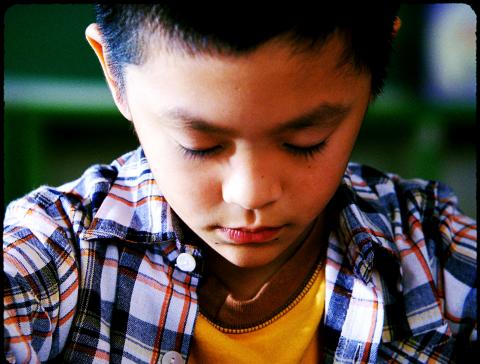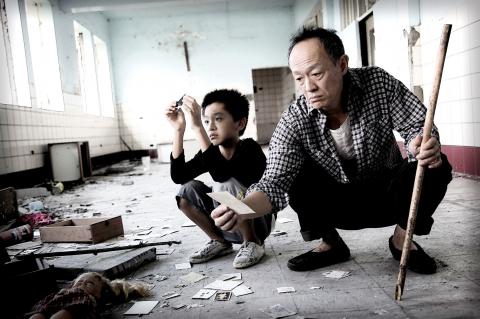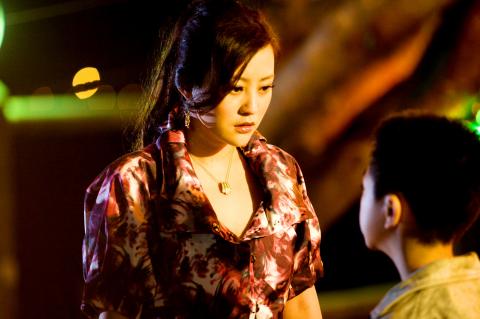After his critically acclaimed feature debut Parking (停車, 2008), a darkly comic urban drama, director Chung Mong-hong (鍾孟宏) moves to the countryside in the exquisitely crafted The Fourth Portrait (第四張畫). The atmospheric film takes a poignant look at the issue of domestic violence through the tale of a boy haunted by loss, and is enhanced by handsome cinematography and a top-notch cast that includes Taiwanese thespians Leon Dai (戴立忍) and King Shih-chieh (金士傑), as well as Hao Lei (郝蕾) from China.
Set in rural Taiwan, the film opens with 10-year-old Xiang, effortlessly played by newcomer Bi Xiao-hai (畢曉海), watching his father pass away in a hospital room. Left alone in the world, the boy manages to survive by stealing boxed meals. An elderly school janitor (played by King) takes Xiang under his wing.
Later Xiang’s estranged mother (played by Hao), remarried to a morose night market vendor (played by Dai), comes to take the boy to his new family. A sense of foreboding envelopes the movie when the train that the mother and son take speeds into a black tunnel, leaving the two devoured by darkness.

PHOTO COURTESY OF ATOM CINEMA
Xiang’s new home is cold and unwelcoming; the stepfather is rancorous and distant. His mother, a Chinese immigrant, seems exhausted by her life as a hostess at a ramshackle karaoke bar. The boy struggles to make sense of his hostile environment by sketching portraits, and finds solace in a newly found friendship with a portly outcast, played by entertainer Lin Yu-chih (林郁智), better known as Na Dou (納豆). The friend makes Xiang an accomplice to his petty crimes.
The story takes a menacing turn when Xiang draws a portrait inspired by a dream about his older brother, who disappeared some years earlier. A series of macabre incidents ensues, gradually laying bare a skeleton in the family closet.
Cowritten, shot and directed by Chung, the film shares a similar episodic approach to storytelling with Parking. The child protagonist’s series of encounters with odd characters offers gripping moments, but prevents the viewer from emotionally investing in the narrative. The distancing effect that works well in Parking to convey urban estrangement is often frustrating when one tries to grasp the emotional poignancy and depth suggested in The Fourth Portrait.

PHOTO COURTESY OF ATOM CINEMA
Nonetheless, Chung is a wizard at evoking moods. The director never shuns away from his background in TV commercials, weaving rich colors, polished compositions and fluid camera work into a cinematography that gives Taiwan’s countryside a dreamlike, surreal quality.
The bleak, hostile environment is inhabited not only by petty criminals and drifters but ominous dark clouds rolling in from a distance and toxic yellow fumes belching out of factories in the background. Most striking of all is the stepfather’s giant fish tank, which exudes an eerie blue light that doesn’t seem to be of this world.
The solid cast lends considerable strength and grace to the work. Hao, almost unrecognizable from her lauded big-screen debut in Lou Ye’s (婁燁) Summer Palace (頤和園, 2006), presents a powerful character study of a Chinese immigrant who comes to Taiwan in search of a better life but ends up disillusioned. Dai is stunningly fierce as the stepfather. Rather than a character grounded in real life, however, Dai’s role feels more like an embodiment of wickedness that seems out of synch with the other rural inhabitants.

PHOTO COURTESY OF ATOM CINEMA
Since his award-winning documentary Doctor (醫生) in 2006, Chung has honed a distinct style and unique sensibility. Given more time to refine his skills in storytelling and character development, the seasoned commercial filmmaker will no doubt grow into much more than a cinematic stylist.

On April 26, The Lancet published a letter from two doctors at Taichung-based China Medical University Hospital (CMUH) warning that “Taiwan’s Health Care System is on the Brink of Collapse.” The authors said that “Years of policy inaction and mismanagement of resources have led to the National Health Insurance system operating under unsustainable conditions.” The pushback was immediate. Errors in the paper were quickly identified and publicized, to discredit the authors (the hospital apologized). CNA reported that CMUH said the letter described Taiwan in 2021 as having 62 nurses per 10,000 people, when the correct number was 78 nurses per 10,000

As we live longer, our risk of cognitive impairment is increasing. How can we delay the onset of symptoms? Do we have to give up every indulgence or can small changes make a difference? We asked neurologists for tips on how to keep our brains healthy for life. TAKE CARE OF YOUR HEALTH “All of the sensible things that apply to bodily health apply to brain health,” says Suzanne O’Sullivan, a consultant in neurology at the National Hospital for Neurology and Neurosurgery in London, and the author of The Age of Diagnosis. “When you’re 20, you can get away with absolute

May 5 to May 11 What started out as friction between Taiwanese students at Taichung First High School and a Japanese head cook escalated dramatically over the first two weeks of May 1927. It began on April 30 when the cook’s wife knew that lotus starch used in that night’s dinner had rat feces in it, but failed to inform staff until the meal was already prepared. The students believed that her silence was intentional, and filed a complaint. The school’s Japanese administrators sided with the cook’s family, dismissing the students as troublemakers and clamping down on their freedoms — with

As Donald Trump’s executive order in March led to the shuttering of Voice of America (VOA) — the global broadcaster whose roots date back to the fight against Nazi propaganda — he quickly attracted support from figures not used to aligning themselves with any US administration. Trump had ordered the US Agency for Global Media, the federal agency that funds VOA and other groups promoting independent journalism overseas, to be “eliminated to the maximum extent consistent with applicable law.” The decision suddenly halted programming in 49 languages to more than 425 million people. In Moscow, Margarita Simonyan, the hardline editor-in-chief of the